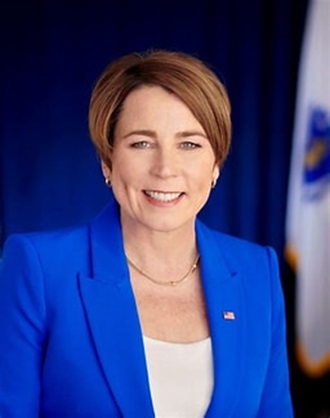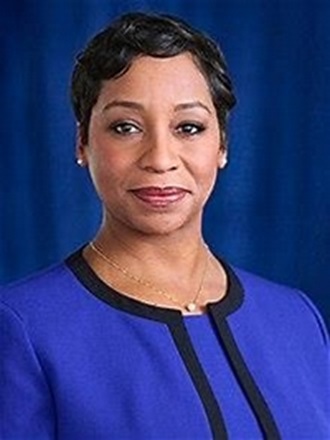Healey, Campbell lean into MCAS battle, urging voters to keep graduation test
THE CAMPAIGN AGAINST a ballot question to end use of MCAS as a high school graduation requirement, which is trailing in polls and getting badly outspent on the airwaves, looked to two of the state’s highest profile officials on Wednesday to try to inject some punch to their effort.
Appearing together at a Roxbury youth services nonprofit, Gov. Maura Healey and Attorney General Andrea Campbellsaid it was important to defeat Question 2 to maintain a single statewide education standard for all public school students.

Governor Maura Healey
“Massachusetts has the best public schools in the country because of our high standards, not in spite of them,” said Healey, the state’s first-term Democratic governor. “Eliminating the MCAS requirement means that we won’t have the same standard for schools across the state. So we’ll have different standards in Randolph than we will in Reading. And that’s a system that I don’t believe sets us up for success. I don’t believe that the standards should be different for students in our state depending on what ZIP code they’re living in and attending school in.”
The ballot question campaign to end the MCAS graduation requirement is being financed and run by the Massachusetts Teachers Association, the state’s largest teachers union. The MTA has long chafed at the state’s reliance on standardized tests to evaluate schools and determine who can receive a diploma. The union says the system punishes students who are poor test-takers and says ending the graduation requirement will enrich classroom instruction by freeing educators from “teaching to the test.”
Healey said if the measure passes, “Massachusetts will become one of two states that do not have a statewide standard for graduation” because Question 2 eliminates the existing statewide standard “without anything to replace it.”
Question 2 proponents have said if the graduation requirement is scrapped that students would have to pass courses that meet the state’s curriculum standards, but there is no statewide set of course requirements that students in all districts must take in order to graduate.
“This would result in more than 300 different and unequal standards for high school graduation across the Commonwealth,” said Campbell, the state’s first-term Democratic AG.

Attorney General Andrea Campbell
“Eliminating the statewide graduation standard will effectively weaken the proficiency we expect students to meet, and that is bad for students and our future,” she said.
“I am also concerned because marginalized students will be the most affected.
A common objective statewide assessment equalizes expectations across school districts and ensures every student can reach the same bar. If students cannot pass basic assessments in math, English or science, the answer is not to eliminate the test. Instead, the focus should be on how we improve the assessments collectively, and how we ensure students who are struggling get the help they need to succeed.”
Healey took aim at what she called “misconceptions” or “maybe misinformation” about the 10th grade tests that students must pass to graduate. “To be clear, no student is forced to go through a one-time high-stakes test,” she said, explaining that students are given up to five chances to pass the test and can then pursue an appeals process.
State officials say 1 percent of the roughly 70,000 high school seniors each year, or 700 students, don’t graduate because they were unable to pass MCAS.
The graduation test, which grew out of the 1993 Education Reform Act, was first put in place for 10th grade students in 2003. Proponents say the test – and the curriculum standards and accountability system that the 1993 ushered in – have pushed Massachusetts from the middle of the pack among states to the top performer on national achievement tests.
But there has been mounting backlash against standardized tests in schools, and the ballot question is leading in recent polls. A poll conducted last month for CommonWealth Beacon and WBUR found 51 percent of likely voters supporting the question and 34 percent opposed. Fifteen percent of voters remained undecided. A Suffolk University poll earlier this month found 58 percent of likely voters supporting the ballot question compared with 37 percent who were opposed.
The Mass. Teachers Association issued a statement Wednesday afternoon criticizing Healey for her stand.
“It’s disappointing that Gov. Healey has chosen to side with the few corporate donors opposing Question 2 and against Massachusetts educators, parents and students,” MTA president Max Page and vice president Deb McCarthy said in a statement. “Massachusetts has the best public schools in the country, in large part because of the highly trained workforce of educators who guide our children through rigorous coursework based on a set of uniform, statewide academic standards that are considered the strongest in the country.”
The Globe reported on Wednesday that the MTA, the sole financial backer of the ballot question, has far outspent the ballot committee opposing the question. The paper said the MTA has spent $7.7 million in staff time and money while the business-backed opposition has spent only $1.2 million.

